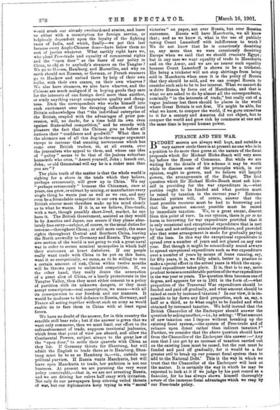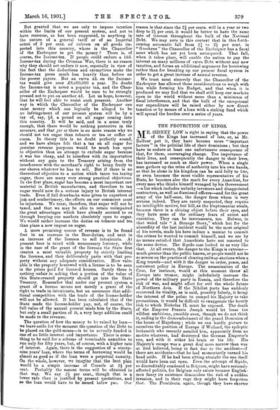FINANCE AND THE WAR.
by immediate taxation. We, to a great extent, dissent from this point of view. In our opinion, there is per se no harm in borrowing for war expenditure provided that it is only occasional and exceptional expenditure that is met by loan and not ordinary annual expenditure, and provided also that some arrangement is made for gradually paying off the loan. In this way the exceptional expenditure is spread over a number of years and not placed on any one year. But though it might be scientifically sound always to spread exceptional expenditare such as war expenditure over a number of years by means of loans running, say, for fifty years it is, we fully admit, better in practice to make a special in the actual years in which the excep.. tional expenditure takes place. It is, that is to say, more prudent to rai se a considerable portion of the war expenditure in the war year or years. The question thus becomes one of degree, and appears for us in 1901 in the form of,—what proportion of the Transvaal War expenditure should be funded and paid off gradually, and what amount should be raised at once by increased taxation? In our view, it is im- possible to lay down any fixed proportion, such as, say, a half or a third, as to what ought to be funded and what obtained by increased taxation. We hold instead that the British Chancellor of the Exchequer should answer the question by asking another,—se., by asking: Whatamount of new taxation can I impose without breaking up the existing fiscal system,—the system of Free-trade and of reliance upon direct rather than indirect taxation ? ' Further, we consider that the above question should have from the Chancellor of the Exchequer this answer :—' Any sum that I can get by an increase of taxation carried out on the existing lines must be raised, but the rest must be funded and paid off gradually, for it would be a far greater evil to break up our present fiscal system than to add to the National Debt.' This is the way in which we trust that the Chancellor of the Exchequer will look at the matter. It is certainly the way in which he may be expected to look at it if we judge by his past record as a financier, for he has always shown himself thoroughly aware of the immense fiscal advantages which we reap by our Free-trade policy. But granted that we are only to impose taxation within the limits of our present system, and not to have recourse, as has been suggested, to anything in the nature of a general tariff or of an Imperial octroi of 5 per cent, ad valorem on all goods im- ported into this country, where is the Chancellor of the Exchequer to get the money ? There is, of course, the Income-tax. If people could endure a 16d. Income-tax during the Crimean War, there is no reason why they should not endure it now, especially in view of the fact that the deductions and exemptions make the Income-tax press much less heavily than before on the poorer payers. But an extra 4d. on the Income- tax would give over £8,000,000 a year. No doubt the Income-tax is never a popular tax, and the Chan- cellor of the Exchequer would be sure to be strongly pressed not to put on another 4d. Let us hope, however, that he will feel able to resist such pressure. Another way in which the Chancellor of the Exchequer can raise money which can logically be alleged to be no infringement of our present system will be by a tax of, say, d. a pound on all sugar coming into this country. It will be said, and in a sense truly enough, that there would be nothing protective in the measure, and that per se there is no more reason why we should not tax sugar than tobacco or tea or coffee or cocoa. In theory this is no doubt perfectly sound, and we have always felt that a tax on all sugar for genuine revenue purposes would be much less open to objection than an attempt to exclude sugar because it was too cheap, and to interfere with its importation without any gain to the Treasury arising from the interference with the merchant's right to bring freely to our shores whatever he has to sell. But if there is no theoretical objection to a nation which taxes tea taxing sugar, there are many very strong practical objections. In the first place, sugar has become a most important raw material in British manufacture, and therefore to tax sugar would now do a serious injury to British internal trade. Even if full drawbacks were given to exporters of jam and confectionery, the effects on our commerce must be injurious. We trust, therefore, that sugar will not be taxed, and that we may be able to retain unimpaired the great advantages which have already accrued to us through keeping our markets absolutely open to sugar. We would rather increase the duties on tobacco and tea than place a new impost on sugar.
A more promising source of revenue is to be found first in an increase in the Beer-duties, and next in an increase of the licenses to sell intoxicants. At present beer is taxed with unnecessary leniency, while in the case of the grant of the licenses the State first creates a most valuable property by strictly limiting the licenses, and then deliberately parts with that pro- perty without any adequate consideration. How valu- able is the property bestowed with a license is to be seen in the prices paid for licensed houses. Surely there is nothing unfair in asking that a portion of the value of this State-created property should go into the State Treasury. Remember that under our present system a. grant of a license means not merely a grant of the right to trade in intoxicants, but an assurance that addi- tional competition with the trade of the license-holder will not be allowed. It has been calculated that if the State made the license-holder pay, not, of course, the full value of the annual present made him by the State, but only a small portion of it, a very large addition could be made to the revenue.
The question of how the money to be raised by loan— we leave aside for the moment the question of the Debt to be placed on the gold-mines—is to be actually funded is one of no little interest and importance. There is some- thing to be said for a scheme of terminable annuities to run only for fifty years, but, of course, with a higher rate of interest. Again there is the suggestion of a ninety- nine years' loan, where the terms of borrowing would be almost as good as if the loan were a perpetual annuity. On the whole, however, we imagine that the best plan would be a simple increase of Consols at 2i per cent. Probably the easiest terms will be obtained in that way. We say 23 per cent., though that is a lower rate than is justified by present quotations, and so the loan would have to be issued below par. Our reason is that since the 21 per cents. will in a year or two drop to 2-i per cent. it would be better to have the same rate of interest throughout the bulk of the National Debt. We may note in this context that in this forth- coming automatic fall from 21 to 2 per cent. in " Goschens " the Chancellor of the Exchequer has a fiscal asset which has not yet been anticipated. That fall, when it takes place, will enable the nation to pay the interest on many millions of extra Debt without any new taxation, and forms an additional argument for borrowing rather than for breaking up our present fiscal system in order to get a great increase of annual revenue.
We trust most sincerely that the Chancellor of the Exchequer has allowed these considerations to weigh with him while forming his Budget, and that when it is produced we may find that we shall still keep our markets open to the world without more than a minimum of fiscal interference, and that the bulk of the exceptional war expenditure will be raised either by new direct taxation or by means of a loan with a. sinking fund which will spread the burden over a series of years.







































 Previous page
Previous page